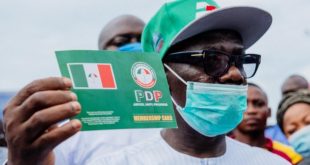BULAWAYO, Zimbabwe, Nov 06 (IPS) – “I’ve lengthy given up on energetic politics,” Gertrude Sidambe, a 36-year-old member of one in all Zimbabwe’s opposition events, tells IPS.
When feminine members of the ruling Zimbabwe African Nationwide Union – Patriotic Entrance complained final month about political violence as male members selected brawn over brains to solicit for positions, the occasion’s Nationwide Secretary for Ladies’s Affairs Mabel Chinomona suggested that they enter the punch-and-insult battlefield and “battle” like everybody else.
The violence has pushed girls additional away from the bruising contests. But it has develop into one other reminder of the nation’s commitments – or lack thereof – towards gender inclusivity and parity and the circumstances girls face of their aspirations for political workplace.
“At one time I used to be assured my a few years within the forefront would culminate in operating for public workplace however that by no means occurred, and that is not as a result of I didn’t attempt. Everybody appeared to suppose males may do a greater job,” Sidambe says.
She made the feedback at a time when Zimbabwe’s political events are engaged selecting representatives for positions that vary from district coordinating committees to native councils and by-elections for vacant legislative seats.
Sidambe’s disillusion with occasion politics is just not uncommon or remoted.
The principle opposition Motion for Democratic Change Alliance (MDC-A) has additionally not been spared.
The occasion has put in movement inner processes to elect representatives who will contest for vacant parliamentary and native council positions as soon as the federal government lifts the moratorium on by-elections due to coronavirus fears.
Final month, authorities was taken to court docket by feminine aspiring candidates difficult the indefinite suspension of the by-elections.
The court docket motion is being supported by the Ladies’s Academy for Management and Political Excellence (WALPE), a neighborhood NGO lobbying for the equal illustration of girls in public management positions.
Based on WALPE, there are 35 vacant parliamentary seats, whereas 55 native council wards are but to be stuffed and the suspension of the by-elections “violates folks’s rights to be represented whoever they need”.
In the meantime, MDC-A potential feminine candidates have complained of being sidelined, amid developments that male candidates have been operating in positions that had beforehand been agreed to be reserved for a feminine candidate.
“It has been normalised that ladies are mobilisers for male candidates, however there comes a time whenever you develop into drained and simply stop after you ask your self ‘what’s in it for me?'” Sidambe says, highlighting a recurring motif every time the Zimbabwe’s political events put together for elections.
Priscilla Misihairambwi-Mushonga, an opposition legislator in Zimbabwe, says there aren’t any binding codes of conduct inside political events relating to gender parity and this has allowed the pushing of girls to the periphery of political participation.
“There are merely no inner occasion guidelines that guarantee political events dwell as much as their proclamations for girls to be a part of management,” Misihairambwi-Mushonga tells IPS.
“Political events are working with out guidelines. It’s a legislation of the jungle, there aren’t any codes of conduct which are sanctionable. It is simply phrases and they aren’t accountable to anyone,” she says.
The interior processes of Zimbabwe’s foremost political events replicate the skewed steadiness in nationwide political management the place in 2018 elections, out of 210 parliamentary seats, 26 have been taken by girls.
That is regardless of Zimbabwe’s dedication to the Southern African Improvement Neighborhood’s Declaration on Gender and Development which seeks 50-50 illustration of women and men in parliament.
A 2018 report by the Worldwide Basis for Electoral Techniques titled Violence Towards Ladies in Elections in Zimbabwe, discovered that ladies “worry each profound bodily violence of their relation to their electoral participation”.
The report additional notes that ladies who make it to parliament usually are not secure both.
“Even as soon as elected to parliament, girls can not escape degrading commentary; ‘a girl nonetheless can not query an MP with out being informed thighs are too huge.’ If she is single, she is accused of getting into politics to discover a husband. ‘If she will’t run a family, how can she run a constituency?'” the report says, citing interviews from respondents.
Sensible Mabweazara, a researcher and educational on the College of the Western Cape in South Africa, believes perceptions about political participation of girls want to vary.
“Ladies are sometimes afraid of this male dominated playground the place some understand their participation as a waste time,” he tells IPS, echoing sentiments of younger political hopefuls equivalent to Sidambe.
Nevertheless, Misihairambwi-Mushonga notes that this has been perpetuated by an absence of onerous and quick guidelines that will impose punishment on political political events.
“There isn’t a recourse for girls who’ve such complaints inside these political events.
“As it’s, it not stunning that political events are doing what they’re doing as a result of they know there aren’t any hurtful sanctions for that sort behaviour,” Misihairambwi-Mushonga tells IPS.
One solution to steadiness the scales and defend girls in Zimbabwe from exclusion in political positions is to create stiffer penalties for political events, Misihairambwi-Mushonga says.
“Events already in parliament will be punished by way of political occasion financing by giving extra to political events which have extra girls candidates and punish the occasion with few girls. There have to be a purpose for good behaviour and pay dearly for unhealthy behaviour,” she says.
In February this yr, the United Nation’s Committee on the Elimination of Discrimination against Women “referred to as on Zimbabwe to enhance implementation of legal guidelines and compliance with the U.N. conventions,” whereas pointing to the “big hole between the wonderful textual content (of the nation’s Structure) and its software”.
As a part of efforts to focus on the dearth of girls in public workplace, the Ladies’s Academy for Management and Political Excellence (WALPE) launched an online drama sequence titled “All Female Parliament” on Oct. 13.
The drama’s transient says amongst different issues, it goals to encourage “girls and women to be daring and take up management positions. It brings out how in opposition to all odds girls got here collectively, resisted patriarchy and labored collectively for the betterment of the nation”.
“Political events are insincere in regards to the inclusion and participation of girls. They make is tough for girls,” Batanai Gwangwawa, WALPE programme supervisor, tells IPS.
“The electoral atmosphere can be very violent which makes girls draw back from political participation. The place a girl defies the system, she’s going to nonetheless have face different challenges males don’t face. Ladies aspiring candidates are subjected to verbal abuse on the highest stage, and extra now misogyny,” she says.
Zimbabwe’s holds nationwide common elections in 2023 however with political jostling coming early with the interior elections inside political events, there may be little to indicate that the scales might be tipped in favour of girls.
© Inter Press Service (2020) — All Rights ReservedOriginal source: Inter Press Service
 Top Naija News: Nigerian News, Breaking News Nigeria and World News Top Naija News is a daily news publication in Nigeria, delivering the latest breaking news in Nigeria and around the world.
Top Naija News: Nigerian News, Breaking News Nigeria and World News Top Naija News is a daily news publication in Nigeria, delivering the latest breaking news in Nigeria and around the world.



